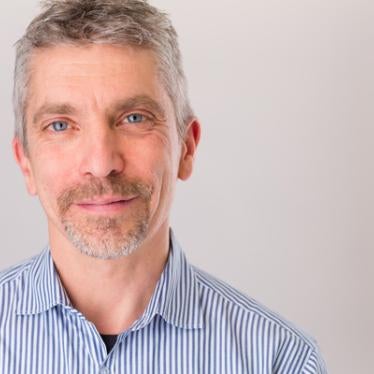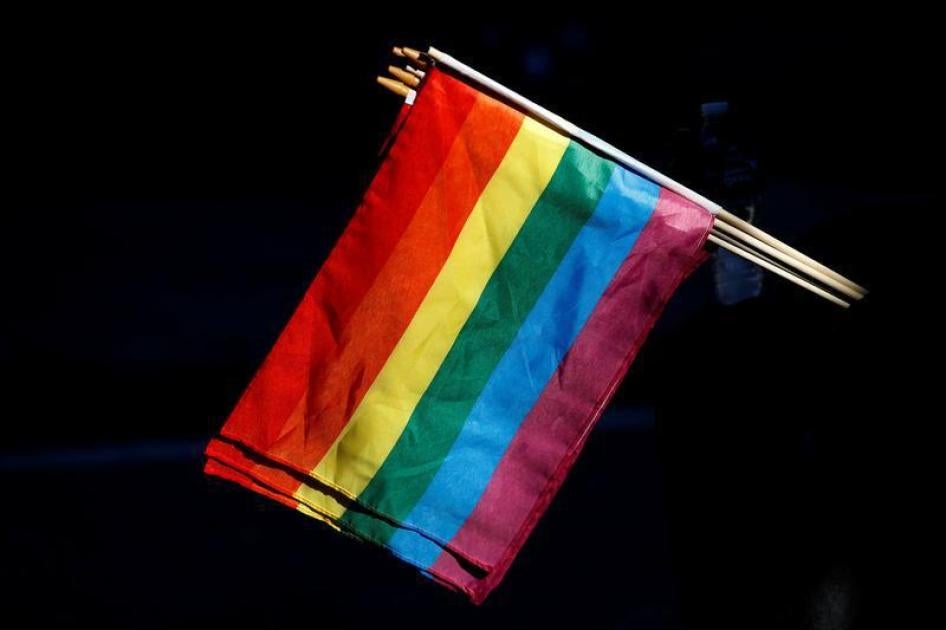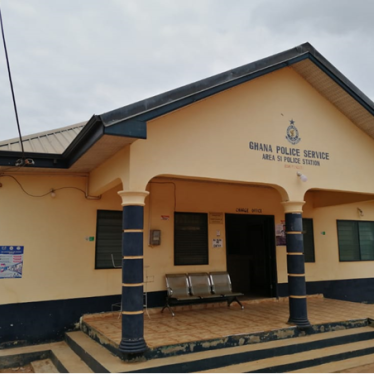Two major geopolitical events during the past year—the Taliban takeover of Afghanistan and the full-scale Russian military invasion of Ukraine—have disrupted millions of lives. Both have resonated in specific ways for lesbian, gay, bisexual, and transgender (LGBT) people.
When the Russian Patriarch Kirill referred to “gay parades” in Ukraine among the justifications for Russia’s invasion, he tapped into a longstanding, politically effective refrain used by Russian President Vladimir Putin that positions Russia as the defender of “traditional values.” This echoes political rhetoric in Poland, where about 100 localities have declared themselves “LGBT-ideology free zones,” and Hungary, where President Viktor Orbán has waged a legislative and rhetorical campaign against [the rights of] LGBT people for political gain.
Shortly before the Taliban entered Kabul last August, a Taliban judge declared that homosexuals should be sentenced to death, either stoned or crushed by a toppled wall. LGBT people in Afghanistan were no strangers to violence and discrimination: the prior government had passed a law in 2018 criminalizing same-sex conduct. Even so, the Taliban return to power compelled many LGBT people to flee to neighboring countries, which also outlaw same-sex relations and where they remain in a precarious situation; those still in Afghanistan face a grim future.
When authorities use religion, culture, or tradition to curtail gender expression or sexual orientation, they usually invoke a collective and singular authority: a narrowly defined concept of the family, a static culture, or a singular religious orthodoxy. And yet the real issue is not culture, but bodily autonomy, the right to make choices about one’s own body. This is a major reason why LGBT rights have become a battleground between pluralism, which liberal democracy promotes, and populist authoritarian rule, which pits individual rights against majoritarian group norms.
Key issues at the forefront of transnational LGBT advocacy during the past year—discrimination and violence based on sexual orientation and gender identity—are commonplace, albeit disparate and country-specific. However, each issue is part of an overarching trend that pits individual rights, enshrined in international human rights law, against narrow, static definitions of the family and culture, intolerant notions of religion, and authoritarian and populist forms of governance
Populists cast LGBT people as threats to the family, religion, and the state. Their playbook enables scapegoating, discrimination, and often violence against LGBT people. LGBT activists continue to make significant progress globally. In this challenging context, LGBT activists must deal with issues including violence committed with impunity against LGBT people, state repression of LGBT rights activism, legislative and judicial obstacles to same-sex couples’ recognition, efforts to restrict sexuality education, and the need to promote the rights of people born with atypical sex characteristics. A wide range of challenges or downright abuses of LGBT rights have been registered around the globe in the last year. But there have also been some victories for people defending LGBT rights.
Bias-motivated rhetoric has fostered sporadic or systematic violence against LGBT people in disparate settings, often with impunity. Cameroon has had an upsurge in mob attacks against LGBT people, after which police have arrested the victims on homosexuality charges. The government of Iraq has failed to protect LGBT people from systemic violence by armed groups, whose actions have gone unpunished. Police in Kenya inadequately investigated the murder of a non-binary lesbian.
In the US, transgender women of color frequently experience violence while facing intersecting discrimination in education, employment, and housing opportunities based on their race, gender, class, ability, and nationality. These factors help explain the staggering rates of murders of transgender people of color since 2016.
Even in South Africa, which leads the African continent in terms of legal protections for LGBT people, at least 20 LGBT people were murdered in bias-motivated attacks in 2021. Encouragingly, the South African government took steps to end impunity for such violence by establishing a National Task Team in 2011 and is updating its existing policy to address root causes of hate crimes and to track their occurrence.
And in Honduras, after the murder of Vicky Hernandez, a transgender woman, during the 2009 military coup, her mother’s tenacity finally brought results. In March 2021, the Inter-American Court of Human Rights found that Honduras was responsible for Vicky’s killing. In May 2022, Honduran President Xiomara Castro promised to comply with court-ordered reparations, which it is hoped will help reduce the high levels of anti-LGBT violence in the country.
The same rhetoric that casts LGBT people as threats to the social order fuels state repression of the very activists at the vanguard of advancing LGBT rights. In Turkey on International Women’s Day last year, activists were arrested and charged with “insulting” the president during protests that expressed support for the rights of LGBT people.
In Kazakhstan, police detained leaders of Feminita—a national feminist initiative that works on the rights of lesbian, bisexual, and queer women— “for their own safety” after an unidentified group of men attacked them. The authorities have also continued to arbitrarily deny Feminita registration as a nongovernmental group.
In Ghana, 21 people attending a workshop on documenting and reporting abuses against LGBT people were arrested and detained. They were held for more than three weeks before the charges were dropped. Their ordeal, from the arrests to the public scrutiny they endured, has continued to affect them psychologically and financially.
In Hungary, the government fined LGBT groups that successfully campaigned against an anti-LGBT referendum. The court rejected most fines but upheld them against two groups. Russia targeted some LGBT groups under the “gay propaganda” law before turning more recently to abusive “foreign agent” laws. In April 2022, even as authorities in Chechnya renewed their assault on LGBT people. a court forcibly closed Sphere—the legal entity under which the Russia LGBT Network that has helped gay men fleeing torture in Chechnya.
Police mistreated LGBT activists in Tunisia during successive anti-government protests there. Widespread, arbitrary arrests of LGBT people in Egypt prompted the UN Human Rights Council to condemn these egregious and systemic abuses.
Violence against LGBT people and attempts to stifle the activists who defend their rights aren’t the only tools of repression. The law itself can undermine bodily autonomy when it prohibits same-sex conduct. While the overarching global trend is toward decriminalization, some regions have stagnated and others have regressed. Uzbekistan’s sodomy law is used as pretext for extortion, and it enables mistreatment in the form of forced anal testing. Indonesia’s Aceh province publicly flogged two men 77 times each for consensual sex in private.
Attempts to repeal the provisions of Singapore’s penal code that outlaw same-sex conduct dead-ended when the appeals court ruled that the appellants lacked standing on the basis that the law was unenforceable. But that is not the end of the issue. The attorney general and other officials have the authority to decide resume prosecution in these cases.
Decriminalization efforts have in fact been one of the bright spots in promoting LGBT rights. A UN human rights treaty body condemned the criminalization of same-sex conduct in Sri Lanka in a long-awaited affirmation that homophobic legislation targeting women violates not only the rights of LGBT people, but also women’s rights. Angola’s new penal code, which excised archaic provisions from the 1886 code and introduced anti-discrimination protections, finally came into effect in 2021. Bhutan decriminalized same-sex conduct. A South Korean court decided that a ban on same-sex conduct in the military is discriminatory and unconstitutional, a victory for years of advocacy by activists.
Another form of structural discrimination that stems from narrow, exclusionary constructions of family denies the rights of LGBT people by refusing to recognize same-sex couples. The past year had mixed results in the area of family law, including access to marriage. A South Korea court declined to recognize same-sex partnerships or extend spousal health insurance benefits in same-sex couples. The UK’s Privy Council, the final court of appeals for several Caribbean islands, upheld rulings from Bermuda and the Cayman Islands disallowing marriage equality, indicating that the Privy Council would take a conservative view of its role.
In the US, a long-awaited Supreme Court decision on whether an adoption agency with a city contract could exclude same-sex couples based on religious conviction sidestepped the broader question and only addressed the specific contract at issue in the case. In Bolivia, a civil registry recognized the union of two same-sex couples, but a case pending before the Constitutional Court will decide if other same-sex couples can enter into civil unions. Activists in Panama are similarly pinning their hopes on court cases—four, to be precise—involving same-sex couples.
Kosovo debated civil unions in the context of the country’s sweeping legal reforms and aspirations to join the EU. And while a court in Namibia rejected the request to legally recognize the relationships of two same-sex couples who were married abroad, the court did note that this was a clear case of discrimination.
In Thailand, activists campaigned to amend the marriage provisions of the existing Civil Code to include same-sex couples. In a strong move toward legal equality, the cabinet approved a civil partnership bill that will grant same-sex couples the same legal rights as married people regarding personal and jointly held property as well as the right to adopt children. The House of Representatives now must vote on the bill.
A Japanese court added momentum to the country’s marriage equality movement, saying that “Legal benefits stemming from marriages should equally benefit both homosexuals and heterosexuals.” In December 2021, Chile’s parliament voted overwhelmingly in favor of same-sex marriage. Meanwhile, Cubans will undertake an unusual exercise—voting—in a referendum about whether to extend marriage to same-sex couples. But putting this rights issue to a popular vote is problematic and follows public protests against allowing same-sex couples to marry.
Younger and future generations will bear the brunt of the sustained attack on sexuality education in many parts of the world, often under the rhetoric of “gender ideology,” which suggests children are being indoctrinated, not educated. The absence of sexuality education will foster the perpetuation of negative stereotypes that can contribute to bias-motivated rhetoric and attacks. Poland introduced a bill that would severely curtail what is taught in schools, but the president vetoed it at the last minute, citing the Ukraine crisis as needing his focus.
Lawmakers have introduced a plethora of bills seeking to restrict sex education in Brazilian schools. In the US, Florida and Alabama enacted “don’t say gay or trans” laws to limit the discussion of LGBT-related topics in schools; at least a dozen more states are considering similar legislation. And Hungary passed a law echoing Russia’s “gay propaganda” law that equates homosexuality with pedophilia as justification for limiting sex education. This move effectively criminalizes the legitimate work of LGBT activists advocating for positive queer visibility in the country.
But in a positive series of moves in the last year, there have been meaningful steps at the national and subnational levels toward recognizing the bodily autonomy of people born with atypical sex characteristics, an important, yet historically neglected, issue. Over the past year, medically unnecessary “normalizing” surgeries on intersex infants came under increased and critical scrutiny, including in the US, Australia, and India.
Argentina and Colombia recognized non-binary identities, as did individual rulings in Brazil and the Mexican state of Guanajuato. The US allowed for an X marker in passports for those who do not want a male or female gender marker.
The International Olympic Committee published guidelines that offer some resistance to the human rights abuses committed in “sex testing” practices on women athletes with variations in their sex characteristics, largely from the Global South. South Africa sought input on a proposed identity management policy that will have positive implications for the legal recognition of transgender identities. In Kuwait, the Constitutional Court scrapped a 2007 law that forbade “imitating a member of the opposite sex” and that led to severe abuse by security forces, improving the legal landscape for transgender people there.
Challenges still persist, however. Legal gender recognition for transgender people lags in Thailand, despite the country’s reputation as an international destination for gender-affirming surgery. When Malaysia’s human rights commission took steps to conduct research on legal gender recognition in the country, political parties and religious authorities criticized its initiative.
Populists have seen LGBT people as easy scapegoats and sources of moral panic for unscrupulous leaders. This backdrop contributes to many of the ongoing challenges faced by activists working toward decriminalization, partnership recognition, accurate identity documents, and an end to discrimination. However, despite various barriers created or revived, LGBT advocates around the world have made a positive impact during a challenging year and will continue their work in the year to come.








